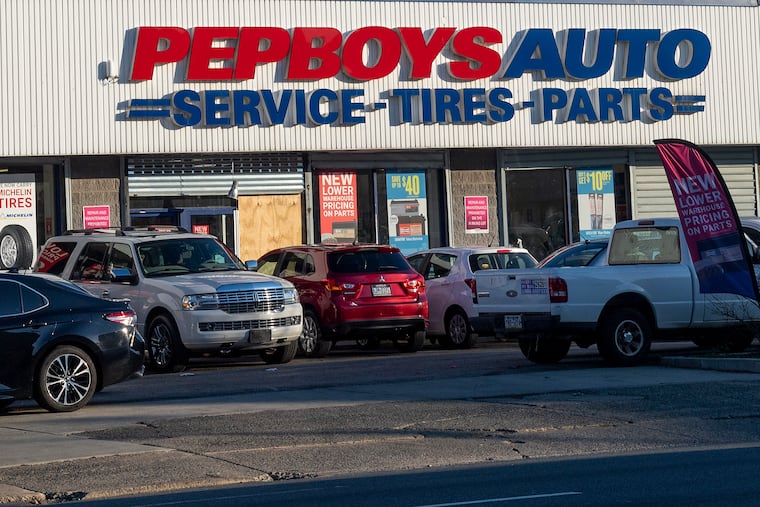Billionaire Carl Icahn has sold Pep Boys’ HQ. As the iconic company turns 100, what lies ahead?
City officials were delighted when billionaire Carl Icahn bought the iconic Philadelphia business Pep Boys four years ago. But Icahn has run into rougher financial territory since then.

The New Year marks 100 years since a group of World War I veterans opened the first Pep Boys at 63rd and Market Streets, where Philadelphia’s suburbs began.
Its stores and garages, festooned with statues and cartoons of founders Manny, Moe, and Jack, sell car parts, mount tires, and change oil for an auto-dependent nation. Its block-long headquarters and warehouse at 3111 W. Allegheny Ave. is a city landmark.
But where is it bound?
Corporate raider Carl Icahn, who has owned Pep Boys since 2016, turns 85 in February. He has been selling off businesses, including Federal-Mogul, the big car-parts maker Icahn once said fit so well with his part stores and repair shops.
Last month, S&P cut its credit rating of his holding company, Icahn Enterprises, to BB (a “speculative,” or junk, rating), requiring higher interest payments to support Icahn-style borrowing. The rating firm’s analysts noted that too many of Icahn’s businesses, including Icahn Automotive, which combines Pep Boys and smaller auto chains, were losing money.
Well before the S&P downgrade, Icahn folded Pep Boys and three other companies (including Horsham-based Aamco Total Auto Care, the transmissions chain) into Icahn Automotive Group — before cutting that into two new companies, separating the stores from the garages.
Sales for the 2,000-store Icahn auto group, including Pep Boys’ 1,000 stores, fell to $660 million last quarter, from $744 million a year earlier. Most of the drop was due to store closings, group chief financial officer Sung Cho told investors in an October conference call.
And Icahn recently sold Pep Boys’ Allegheny Avenue headquarters, though for now, it is leasing back some of it. Spokeswoman Arianna Sherlock would not say how much space it has leased or say for how long. Nor would she say how many of the 500 jobs at the headquarters when Icahn bought Pep Boys were still based there.
Sherlock said the billionaire Icahn was still putting money into Pep Boys, investing in technology to permit customers to order parts online, or to book car repairs that way. too.
“We remain committed to the Philadelphia area,” which still “has one of the densest Pep Boys store-footprints in the country,” she said.
“We look forward to the company celebrating its 100th anniversary in 2021 as a Philadelphia-based business,” said Kevin Lessard, spokesman for the city Commerce Department, with a hopeful tone. He acknowledged that city officials haven’t met with Pep Boys executives since 2018.
When Icahn paid just more than $1 billion for Pep Boys to outbid tire giant Bridgestone-Firestone four years ago, city leaders were upbeat. They hoped they could not just hold on to the company’s main office, but also even gain jobs.
They saw Icahn’s purchase as a step to reverse the exodus that has turned Philadelphia, once a center of American manufacturing, finance, and energy companies, into just another branch town with less than its share of corporate headquarters and the jobs, taxes, and charity they provide.
Japanese-owned Bridgestone-Firestone was expected to run Pep Boys out of its U.S. headquarters in Tennessee. When Icahn won out, Mayor Jim Kenney dispatched his Commerce Department to urge Icahn to enhance the Allegheny Avenue headquarters — and even move some of his own investment activities here from high-cost Manhattan.
“The city did reach out, and we really appreciate it,” Pep Boys general counsel Brian Zuckerman said at the time, shortly before he and other Philadelphia-based Pep Boys executives went off the payroll. Some were replaced by executives with Icahn’s smaller AutoPlus chain in Georgia.
Icahn also sent his longtime lawyer, Daniel A. Ninivaggi, to run Icahn Automotive. Though based in New York, Ninivaggi pledged to “spend a lot of time in Philly,” to keep the Pep Boys “core team” here, and even to increase local staff. He also added parts from Icahn’s Federal-Mogul manufacturing group to Pep Boys shelves.
And then in 2018, Icahn Enterprises sold Federal-Mogul to Tenneco Corp. for $2.5 billion (plus debt), while plowing cash into the oil business, which Icahn expected would gain value during the pro-petroleum Trump administration. Ninivaggi departed Icahn Automotive and Pep Boys.
Brian Kaner, chief executive for the auto-service wing, has an office in Philadelphia but lists his home on social media as Indianapolis. Christopher Cox, his opposite number at the parts division, works out of Georgia.
The top tech officer serving both companies remains primarily based in Philadelphia. But the chief financial, legal, workforce, and marketing officers work in places ranging from New York to Detroit.
As for Icahn himself, he left New York City for Florida in 2019, citing high taxes as a reason.
Icahn has continued restructuring its auto businesses, Icahn Enterprises chief executive Keith Cozza told investors in the October conference call. Cozza is now working closely with Icahn’s son, Brett, who returned to the company this fall and is now his father’s official successor.
Last month, after cutting Icahn Enterprises’ credit rating, S&P analysts noted the company’s debt had doubled over the last year, even after Icahn pumped in an additional $750 million in cash. This partly offset falling oil prices on its oil-refining investments.
In addition, S&P, noting the enterprise’s ongoing losses and shrinkage through asset sales, deemed that it no longer had a “satisfactory” risk profile, only a “fair” one. The asset shedding included Icahn’s sale this year of most of his stake in casino giant Caesar’s Entertainment,
Pep Boys has plans for celebrating its 100th year, said spokeswoman Sherlock. The company, she said, has put out a new “commemorative calendar that takes a trip through the decades using the vehicles and milestones of the times.”
And, she said, it will continue to back community activities in the city where it was founded.